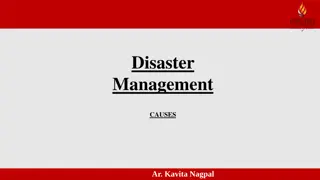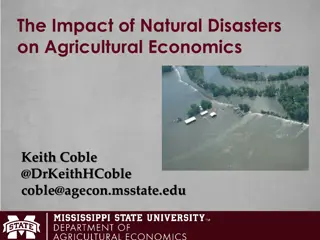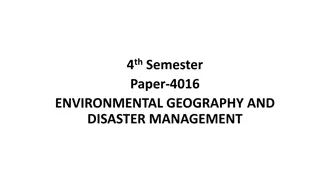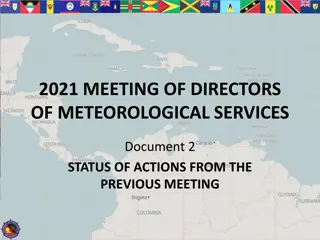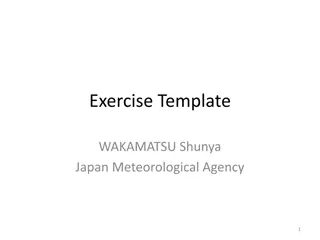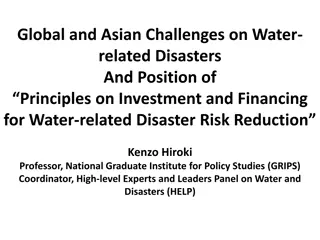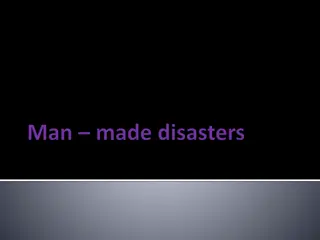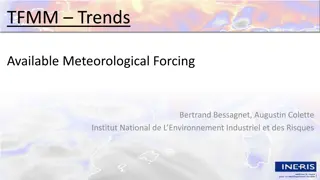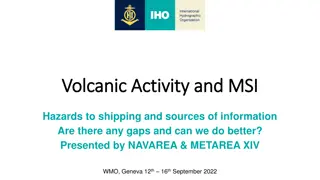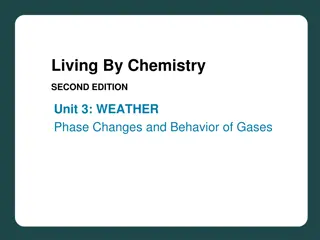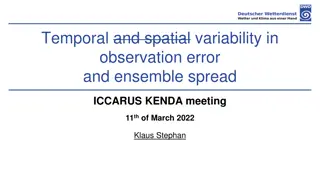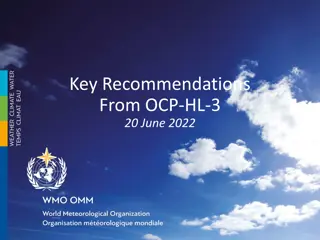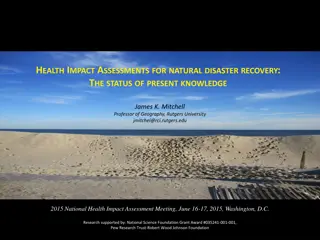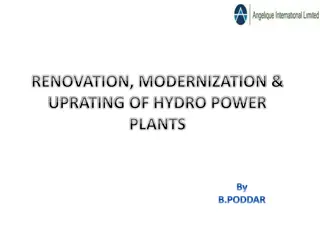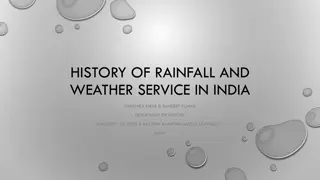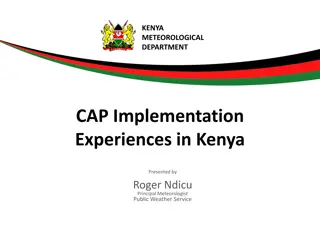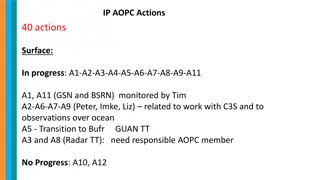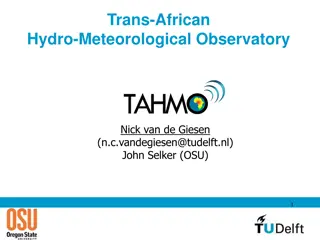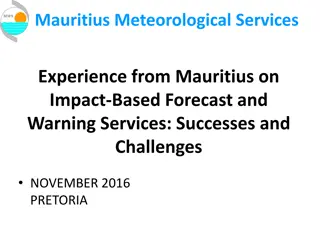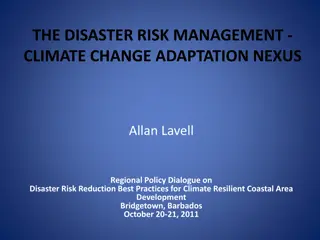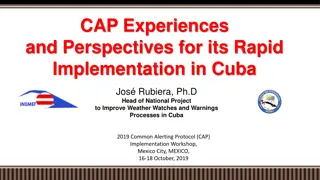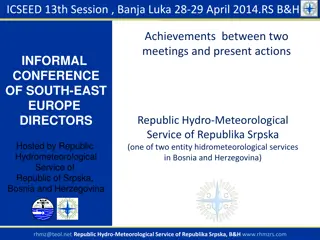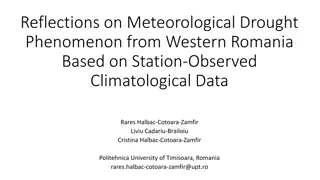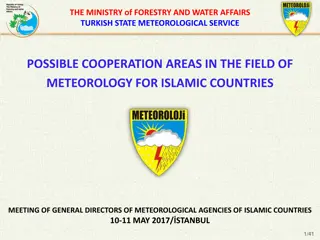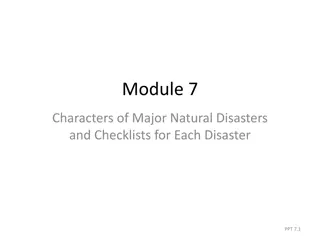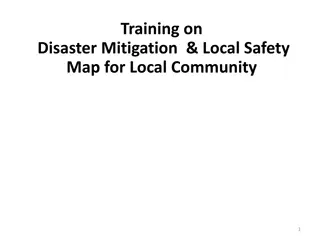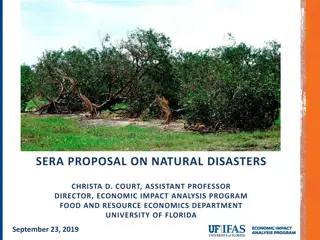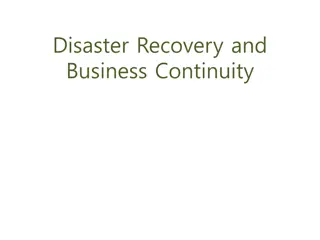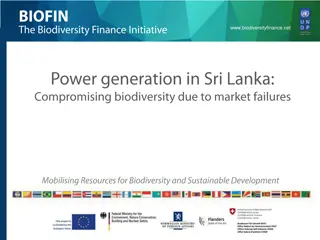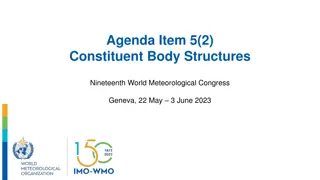Geospatial Comparison of Economic Change and Climate Disasters in Asia-Pacific
This study explores the impact of natural disasters on economic indicators in Southern and Western Asian countries over time, aiming to assist in policy-making by understanding the relationship between natural disasters and the economy. It discusses the increasing incidences of extreme weather event
4 views • 18 slides
Initial Composition and Requirements of GBON for Effective Meteorological Monitoring
The 19th World Meteorological Congress established the Global Basic Observing Network (GBON) to enhance meteorological monitoring worldwide. The GBON includes specific resolutions, guidelines, requirements, and compliance criteria for surface land stations, upper air stations, aircraft data, and rem
2 views • 24 slides
Understanding the Relationship Between Intangible Cultural Heritage and Disaster Risk Reduction
This PowerPoint presentation by UNESCO explores the connection between Intangible Cultural Heritage (ICH) and Disaster Risk Reduction (DRR). It covers key concepts like disasters, risks, vulnerabilities, and resilience, emphasizing the importance of safeguarding and mobilizing ICH in the face of dis
6 views • 23 slides
Understanding Natural Disasters and Their Causes
Explore the various types of natural disasters such as meteorological, geophysical, hydrological, climatological, and biological events, each with unique causes like storms, earthquakes, floods, droughts, wildfires, and more. Learn how these disasters impact the environment and living organisms.
9 views • 16 slides
Understanding Psychological First Aid in Times of Disasters
Explore the psychological impact of disasters, learn the common reactions, and understand the core actions of Psychological First Aid (PFA). Discover how stress and disasters affect communities and individuals, common reactions to disaster stress, and when professional help may be needed.
0 views • 42 slides
Understanding Agricultural Risk Management in the Face of Natural Disasters
Exploring the impact of natural disasters on agricultural economics, this content delves into the challenges faced by farmers and the approaches available for managing risks. From analyzing the Billion-Dollar Disasters in the US to discussing private and public risk management provisions, the conten
3 views • 20 slides
Understanding Different Types of Disasters and Their Impact
Disasters, whether natural or man-made, can cause massive disruptions leading to human suffering, economic loss, and environmental damage. Natural disasters like earthquakes and cyclones, geological disasters such as volcanic eruptions, hydrological disasters like tsunamis, and climatological disast
0 views • 11 slides
Strategic Communications for NASA Earth Applied Sciences Disasters Program
NASA's Earth Applied Sciences Disasters Program aims to enhance disaster prediction, preparedness, response, and recovery through Earth observations. The program utilizes strategic communications to raise awareness about disaster impacts and the importance of NASA's work. It emphasizes the role of h
1 views • 14 slides
Understanding Chemical Disasters in the Indian Chemical Industry
Chemical disasters pose a significant threat to the Indian chemical industry, impacting human lives, property, and the environment. Factors contributing to these disasters include ageing process plants, human errors, design defects, and natural events. Proper prevention measures, such as hazard iden
0 views • 13 slides
2021 Meeting of Directors of Meteorological Services - Actions and Updates
The document discusses the status of actions from the previous meeting of the directors of meteorological services in 2021. It includes updates on convening a committee for reviewing proposed courses, resolving operational matters, and implementing various meteorological services. The content also e
0 views • 4 slides
Climate Change Analysis by Japan Meteorological Agency
Tokyo Climate Center, under Japan Meteorological Agency, uses climate models to assess global warming effects. The observed trends in Tokyo show a significant rise in temperature but no discernible trend in precipitation. Future projections indicate a substantial increase in temperature with uncerta
1 views • 6 slides
Challenges and Solutions in Water-Related Disasters
Exploring the global and Asian challenges posed by water-related disasters, this presentation by Kenzo Hiroki delves into the importance of investing in disaster risk reduction. Highlighting the increasing frequency and impact of natural disasters, particularly those related to water, the images and
0 views • 28 slides
Man-made Disasters: Short-term Events and Long-term Consequences
Man-made disasters come in two main forms: short-term events like oil spills or nuclear accidents, and long-term consequences such as climate change and loss of biodiversity. This article covers incidents like the Westgate Bridge Catastrophe in Melbourne and the Tasman Bridge Collapse in Hobart, hig
0 views • 24 slides
Meteorological Forcing Trends and Hindcasts for Climate Research
The content discusses the available meteorological forcing trends analyzed by Bertrand Bessagnet and Augustin Colette from Institut National de L'Environnement Industriel et des Risques. It explores the rationale behind using ECMWF/IFS for recent campaign analyses and the need to find a consistent 1
0 views • 5 slides
Enhancing Safety Measures for Ships during Volcanic Activity
Analyzing the hazards posed by volcanic activity to maritime shipping, this presentation explores the various risks such as physical damage, loss of stability, and impacts on instruments and engines. It discusses sources of information available, including Volcanic Ash Advisory Centers and Volcanic
0 views • 8 slides
Meteorological Data Analysis and Visualization Tools for Regional Weather Services
Explore advanced tools and technologies for analyzing and visualizing meteorological data in regional weather services. From observational variables to forecast and ensemble models, learn about different plotting methods, interactive features, and map layers used in the field of meteorology. Enhance
0 views • 6 slides
Exploring Weather Phenomena and Meteorological Predictions
Dive into the fascinating world of weather phenomena and the science behind meteorological predictions in this unit of Living By Chemistry SECOND EDITION. Learn about proportional relationships, temperature scales, behavior of gases, and how to interpret weather maps to make accurate predictions. En
0 views • 19 slides
Insights on Observation Error, Ensemble Spread, and Radar Reflectivity in Meteorological Analysis
Explore topics such as temporal and spatial variability in observation error, ensemble spread analysis, baseline observations at DWD, estimation of observation errors, and radar reflectivity analysis. Gain insights into data processing and interpretation in meteorological studies.
0 views • 26 slides
Enhancing Societal Benefits: Key Recommendations from OCP-HL-3, June 2022
NMHSs, research, and the private sector are fostering partnerships to enhance societal benefits. Policies, legislation, and sustained funding are crucial for the sound development of meteorological services. NMHSs must evolve, emphasize socioeconomic needs, and establish win-win partnerships. WMO's
0 views • 6 slides
Health Impact Assessments for Natural Disaster Recovery
The study examines the status of knowledge related to health impact assessments for natural disaster recovery, emphasizing the importance of considering the long-term health impacts of disasters. It highlights how disasters and recovery actions can have lasting consequences on community health and w
0 views • 10 slides
Renovation, Modernization, and Uprating of Hydro Power Plants
The renovation, modernization, and uprating of hydro power plants involve enhancing efficiency, output, and reliability of aging assets through implementing latest technology. Factors such as service conditions, stress levels, and maintenance standards significantly impact the life expectancy of hyd
0 views • 19 slides
Evolution of Rainfall Monitoring and Meteorological Services in India
The history of rainfall and weather services in India dates back to the early 19th century when the observatory in Madras began recording rainfall in 1793. The India Meteorological Department played a vital role in standardizing rainfall measurements and providing technical guidance to state governm
0 views • 10 slides
Implementation Experiences of CAP by Kenya Meteorological Department
Kenya Meteorological Department (KMD) has been implementing the Common Alerting Protocol (CAP) since late 2012 to enhance the production and dissemination of weather advisories and warnings. KMD is responsible for generating weather alerts, identifying threat events, and classifying messages based o
0 views • 24 slides
Progress and Actions in Meteorological Data Exchange
International efforts are underway to enhance the exchange of meteorological data, including SYNOP and CLIMAT reports, to improve data archives and analysis. Key actions involve monitoring data receipt, upgrading web systems for data visualization, and providing precipitation data to global centers.
0 views • 14 slides
Innovations in Hydro-Meteorological Observatories for Sustainable Environmental Monitoring
This document showcases various design principles and technologies used in the Trans-African Hydro-Meteorological Observatory project, aiming to enhance data collection in meteorology and hydrology for sustainable land monitoring. Key features include robust, low-cost, and self-calibrating systems t
0 views • 33 slides
Impact-Based Forecasting and Warning Services in Mauritius: Successes and Challenges
The experience of the Mauritius Meteorological Services in implementing Impact-Based Forecasting and Warning Services is detailed, highlighting successes and challenges encountered in November 2016. The article discusses the main weather hazards faced by Mauritius, such as tropical cyclones, heavy r
0 views • 21 slides
Exploring Pumped Hydro Energy Storage Technologies
Pumped hydro energy storage systems utilize gravitational potential energy of water to store and generate electricity. They are efficient and versatile, with various types such as electro-chemical, thermal, and lithium-ion battery storage. Applications include energy balancing, load leveling, and em
0 views • 10 slides
Disaster Risk Management and Climate Change Nexus in Caribbean Region
The Caribbean region faces critical challenges due to the intersection of disaster risk management and climate change, with annual hydro-meteorological disasters on the rise. Countries like Haiti, Cuba, and Puerto Rico are experiencing increasing disaster impacts, urging immediate attention to clima
0 views • 20 slides
CAP Implementation in Cuba: Experiences and Perspectives for Rapid Progress
José Rubiera, Ph.D., discusses the urgent need for implementing the Common Alerting Protocol (CAP) in Cuba to enhance weather watches and warnings. The challenges faced by the Cuban Meteorological Service are explored, along with plans for CAP implementation in 2020. The overview of Cuba's weather
0 views • 37 slides
Informal Conference of South-East Europe Directors on Hydro-Meteorological Services
ICSEED 13th Session in Banja Luka focused on achievements and actions between meetings of Hydro-Meteorological Services in Bosnia and Herzegovina. The conference highlighted the Memorandum of Understanding between different institutions for cooperation in meteorology and hydrology. Through cross-bor
0 views • 23 slides
Hydro Power Development and Engineering Marvels in India
Explore the fascinating world of hydro power engineering marvels in India, featuring iconic dams like Tehri Dam, Bhakra Dam, Nagarjuna Sagar Dam, and Sardar Sarovar Dam. Learn about the significant contributions of hydro power projects to India's development and agriculture sector, showcasing the gr
0 views • 15 slides
Analysis of Meteorological Drought in Western Romania: A Case Study of Timisoara Area
Climate changes in Eastern Europe have led to an increase in extreme weather events like droughts in Western Romania. This article focuses on the Standardized Precipitation Index analysis of meteorological drought over the last 50 years in Timisoara. Results indicate a rise in severely dry months du
0 views • 20 slides
Collaboration Opportunities in Meteorology for Islamic Countries
The Ministry of Forestry and Water Affairs in Turkey, along with the Turkish State Meteorological Service, organized a meeting for General Directors of Meteorological Agencies from Islamic countries in May 2017 in Istanbul. The areas of possible cooperation included observations and observing system
0 views • 9 slides
Exploring Natural Disasters and Environmental Impact
Dive into the exhibition "Ecology" that sheds light on major natural disasters, their effects on the environment and animals, and the importance of protecting our surroundings. Learn about surviving disasters, including tornadoes, and historical events like the North Korean March of Suffering. Disco
0 views • 31 slides
Comprehensive Training Module on Natural Disaster Preparedness
In this comprehensive training module, participants will learn about various natural disasters, their causes, and characteristics. They will also be equipped with the necessary knowledge to prepare emergency procedures checklists tailored to different types of disasters. The module covers a range of
0 views • 52 slides
Disaster Mitigation & Local Safety Training for Nepali Communities
This training program focuses on understanding disaster risks, particularly earthquakes, in Nepal. It covers topics such as the geographical structure of Nepal, responding to earthquake disasters, local safety mapping, types of disasters (natural and man-made), major disasters in Nepal, and historic
0 views • 26 slides
Understanding the Economic Impact of Natural Disasters on Agriculture
Natural disasters in the United States have led to significant economic losses, with Florida alone experiencing billions in damages annually. The SERA Proposal focuses on assessing vulnerabilities, enhancing system resilience, and utilizing state-of-the-art tools for disaster impact assessment, espe
0 views • 31 slides
Importance of Disaster Recovery and Business Continuity Planning
Disaster recovery and business continuity planning are crucial for businesses to survive major disasters and continue operations. This involves assessing business impacts, creating documentation, and planning for various types of disasters. Failure to plan can lead to significant revenue loss, damag
0 views • 46 slides
Challenges and Opportunities in Sri Lanka's Energy Sector
Sri Lanka's energy landscape faces various challenges including reliance on coal, exhausted hydro power capacity, and low efficiency in power generation. Major issues involve considering coal without accounting for externalities, low hydro plant factors, and government vs. private ownership. Improvi
0 views • 16 slides
Evolution of Constituent Bodies in World Meteorological Congress
The evolution of constituent bodies in the World Meteorological Congress from 1951 to 2019 highlights key structural changes, reviews, repeated proposals, and the 2019 governance reform as a significant event. The continuous process of improvement aims to enhance coordination, management, planning,
0 views • 13 slides



